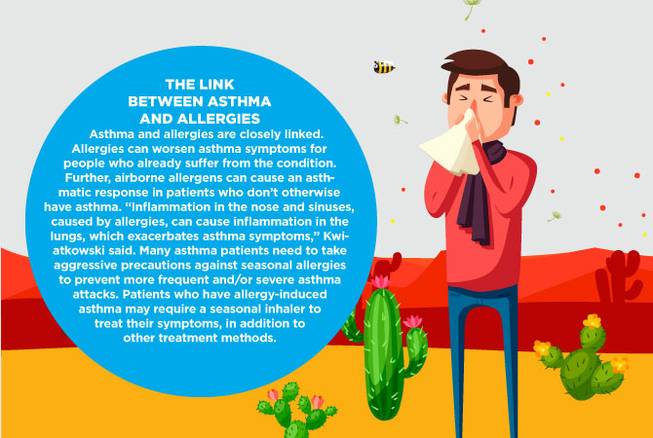
Monday, April 17, 2017 | 2 a.m.
Springtime in Las Vegas brings many welcome changes — warm weather, long days, blooming flora. Unfortunately, the season also ushers in a host of tough symptoms for allergy sufferers.
“We’re currently in the middle of allergy season, which essentially peaks during March and April,” said Terrance Kwiatkowski, MD, ENT-Otolaryngology specialist at Sunrise Hospital and Medical Center. “We usually see another bump in September and October, and many patients suffer year-round because of irritants, such as dust and debris, that get blown around in the desert wind.”
While navigating seasonal allergies can be difficult, many options can help treat, prevent and alleviate symptoms.
Symptoms and cause
Seasonal allergies can induce a variety of symptoms that vary patient to patient, and they occur as a result of the immune system’s response to certain irritants. “The symptoms and severity depend on the degree of the inflammatory response — triggered by the immune system — by the allergen for the individual patient. In other words, it’s not the allergen itself but the response it induces in the person,” Kwiatkowski said.
Common symptoms include sneezing, runny nose, nasal congestion, itchy/watery eyes, sore throat, fatigue, headache, sinus pressure and wheezing/difficulty breathing.
More severe symptoms can include facial pain, eye pain, tooth pain, hives/rashes and other skin issues.
The link between asthma and allergies
Asthma and allergies are closely linked. Allergies can worsen asthma symptoms for people who already suffer from the condition. Further, airborne allergens can cause an asthmatic response in patients who don’t otherwise have asthma.
“Inflammation in the nose and sinuses, caused by allergies, can cause inflammation in the lungs, which exacerbates asthma symptoms,” Kwiatkowski said.
Many asthma patients need to take aggressive precautions against seasonal allergies to prevent more frequent and/or severe asthma attacks. Patients who have allergy-induced asthma may require a seasonal inhaler to treat their symptoms, in addition to other treatment methods.
Treatment
There are many treatment options for allergies, including antihistamines, steroid shots, allergy immunotherapy shots, inhalers, nasal sprays, eye drops and decongestants. Many of these options are available over the counter, or by prescription depending on the severity of symptoms and the specific needs of the patient.
“Nowadays, over-the-counter medications are excellent for treating most allergies — they are the prescription medications of 10-15 years ago. You can also never go wrong with nasal saline irrigation rinses,” Kwiatkowski said, describing a technique that can help reduce symptoms by keeping the nasal passageways moist. Many people may also need to use a combination of allergy treatments to best tackle their symptoms.
“It’s important to have the right antihistamines and decongestants to take as needed. Patients should also consider seeing their doctor for a seasonal steroid shot or an allergist/immunologist if they’re intolerant to over-the-counter medications or are having more severe symptoms, such as chronic sinus pain,” Kwiatkowski said.
Easing symptoms
Prevention can go a long way for seasonal allergy sufferers.
Tips to help minimize allergen exposure include:
• Check the daily pollen count and plan accordingly — schedule outdoor activities for low-pollen days and spend time indoors when the pollen count is high
• Keep windows and doors in your home shut
• Change your air conditioner filters regularly and look for ones designed for fighting allergens
• Vacuum and/or mop floors often
• Try air filters, ionizers and humidifiers in the rooms you spend the most time in
• Wash your bedding, drapes and curtains once a week
• Consider using hypoallergenic sheets, pillows, pillowcases and comforters
• Wear a facemask that covers your nose and mouth while gardening or dealing with plants outdoors
• Take off your shoes when entering your house to avoid tracking pollen and other irritants inside
• Shower and wash your hair in the evening to remove pollen that’s accumulated on your body throughout the day
• Keep your pets indoors when possible and give them regular baths to rinse away pollen they’ve picked up in their fur
• Stay well hydrated to help keep your nose and sinuses moist
Does consuming local honey help?
Consuming local honey and/or bee pollen is a common holistic approach to preventing allergies.
The theory as to why this may work is similar to that of allergy immunotherapy shots: by ingesting honey/bee pollen, you’re also ingesting trace amounts of local plant pollens that are carried by bees. In turn, this builds your immune system’s tolerance to some airborne allergens. However, while allergy immunotherapy shots are proven to work for many people, the jury is still out on whether local honey has a similar effect.
“The scientific evidence is lacking, but I have many patients who feel honey or bee pollen helps them greatly, and I have no reason to think otherwise. In my mind, any excuse to eat honey is a good excuse,” Kwiatkowski said.

Join the Discussion:
Check this out for a full explanation of our conversion to the LiveFyre commenting system and instructions on how to sign up for an account.
Full comments policy